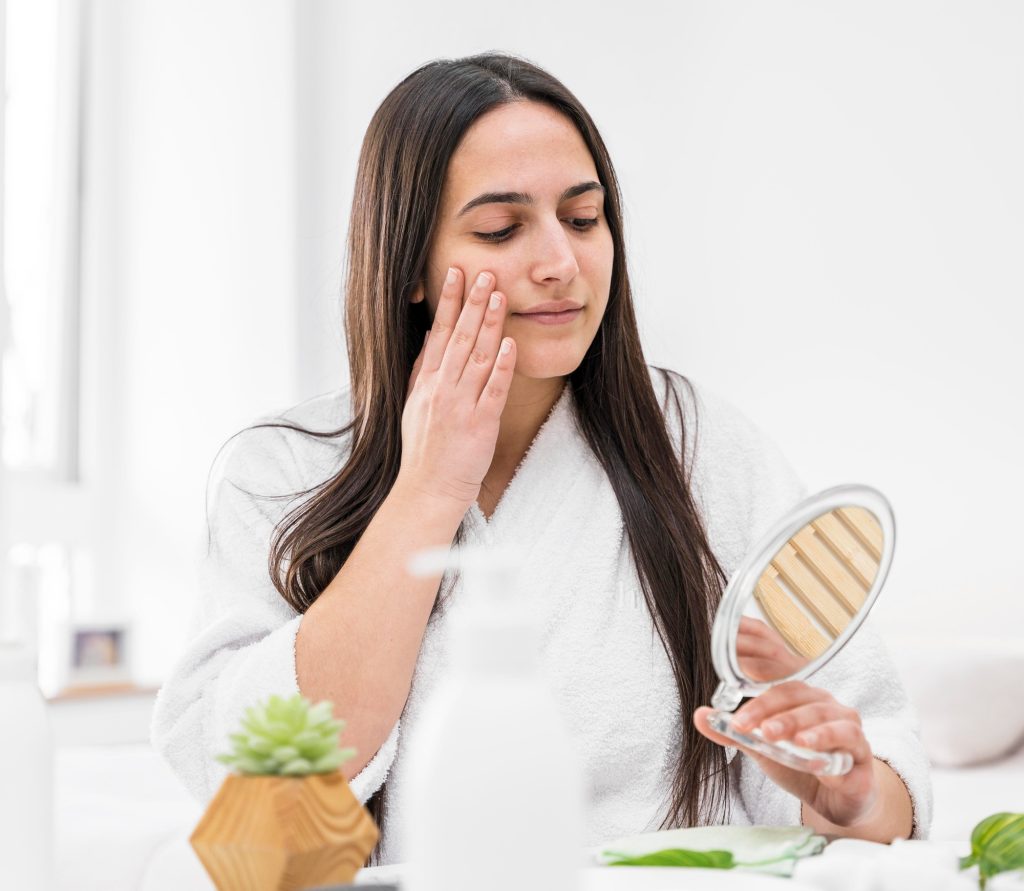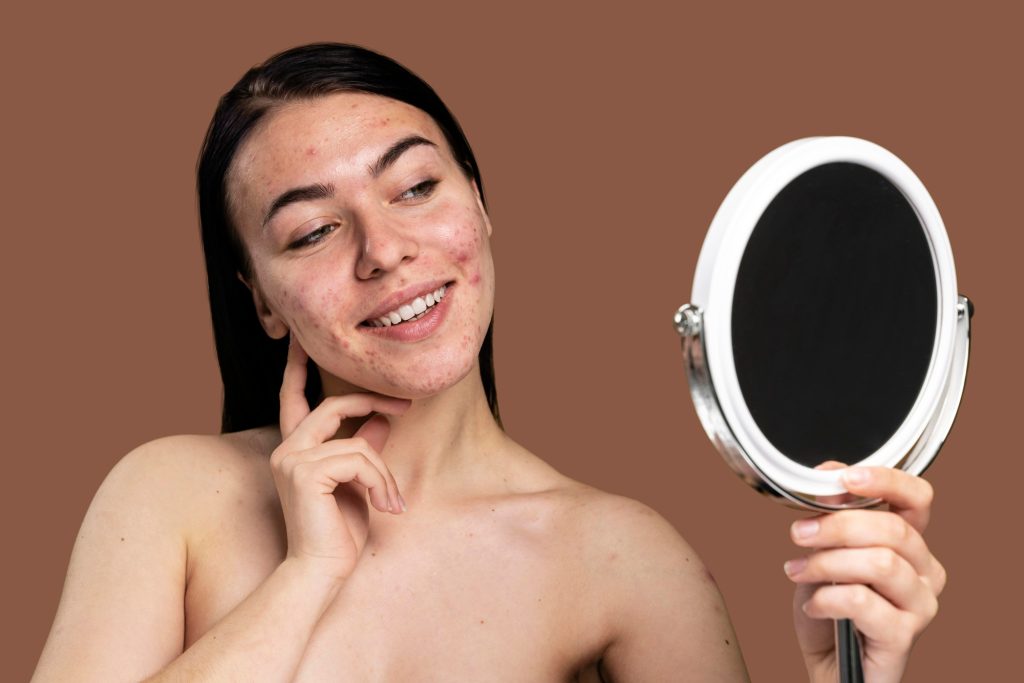Discover the key factors that play a significant role in the development of acne.
Understanding the Main Factors Contributing to Acne Development
Are you tired of waking up to a face full of unsightly pimples and stubborn acne? Don’t worry, you’re not alone! In this article, we will dive deep into the world of acne and its main contributing factors. So grab a cup of tea and get ready for a fun and informative journey!

What is Acne?
Before we learn about the factors that cause those pesky zits to pop up, let’s understand what acne is all about. Acne, my friend, is a common skin condition that affects people of all ages. It usually manifests as pimples, blackheads, and whiteheads, often causing frustration and self-consciousness.
Now, let’s explore the interesting world of acne and the various factors that contribute to its development. Brace yourself for some fascinating insights!
Definition and Overview of Acne
Acne is more than just a couple of pimples on your face. It’s a complex skin condition that occurs when your hair follicles become clogged with oil and dead skin cells. This leads to the formation of comedones, which are simply fancy words for blackheads and whiteheads.
But what exactly causes this clogging of hair follicles? Well, let’s take a closer look at the role of sebum in acne development. Your skin produces oil, scientifically known as sebum, to keep it hydrated and protected. Sebum is essential for maintaining the health of your skin, but when its production goes into overdrive, it can mix with dead skin cells and block your pores. And that’s when acne sneaks in uninvited!
Imagine your hair follicles as tiny tunnels on your skin’s surface. When sebum and dead skin cells accumulate within these tunnels, they form a plug, creating the perfect environment for acne-causing bacteria to thrive.
The Science Behind Acne Development
Now, let’s unravel the scientific mysteries behind acne. One of the main players in acne development is a little something called Propionibacterium acnes. No, it’s not some sort of outer-space creature, but a bacteria that naturally resides on your skin. However, when your hair follicles become clogged, this mischievous bacterium finds itself in a feast of excess oil and debris. As it indulges in this feast, it triggers an inflammatory response from your immune system, leading to the characteristic redness, swelling, and discomfort associated with acne.
But it’s not just bacteria that steals the show. Hormones, genetics, and even your diet can all contribute to the development of acne. Hormonal fluctuations, particularly during puberty, can increase sebum production, making teenagers more prone to acne breakouts. Similarly, individuals with a family history of acne are more likely to experience this skin condition themselves. And let’s not forget about the impact of diet. While the link between diet and acne is still being explored, certain studies suggest that high-glycemic foods and dairy products may exacerbate acne symptoms.
So, as you can see, acne is not a simple skin issue. It involves a complex interplay of factors, from the overproduction of sebum to the presence of bacteria and hormonal imbalances. Understanding these factors can help us develop effective strategies for preventing and managing acne.
The Role of Genetics in Acne Development
We all know that our genes determine everything from our eye color to our unique personalities. But did you know that they also play a role in acne development? Yep, blame it on your DNA!
Acne, the bane of many teenagers and adults alike, is a complex skin condition that can be influenced by various factors. While it’s easy to attribute breakouts to poor skincare habits or hormonal changes, genetics also have a significant impact on the development of acne.
Understanding Genetic Predisposition
If your parents struggled with acne, chances are you might too. Just like eye color, your genes can predispose you to certain skin conditions, including acne. It’s like inheriting a family heirloom you didn’t ask for!
Genetic predisposition refers to the increased likelihood of developing a particular trait or condition based on your inherited genes. In the case of acne, certain genetic variations can make your skin more prone to clogged pores, inflammation, and the overproduction of sebum, the oily substance that contributes to acne formation.
So, the next time you notice a pimple on your face, give your parents a playful smile. After all, they helped you inherit those stunning good looks and the occasional zit!
Studies Linking Genetics and Acne
Scientists have been hard at work trying to understand the intricate relationship between genes and acne. While the exact genes responsible for acne are yet to be discovered, several studies have shown promising connections.
One study published in the Journal of Investigative Dermatology found that variations in a specific gene called TNF-alpha were associated with an increased risk of developing acne. TNF-alpha is a pro-inflammatory cytokine that plays a role in the body’s immune response. When there is an overproduction of TNF-alpha, it can trigger inflammation in the skin, leading to acne breakouts.
Another study conducted by researchers at the University of California, Los Angeles (UCLA), identified a gene called LIPN that is involved in the regulation of sebum production. Sebum is essential for maintaining skin hydration, but excessive production can contribute to acne formation. The study found that certain variations in the LIPN gene were more prevalent in individuals with acne-prone skin.
These findings highlight the complexity of acne development and the role that genetics play in this common skin condition. So, if you’re feeling a little blue about your acne, remember that it’s not just about your skincare routine and lifestyle choices. Your genes also have a say in the matter!
Hormonal Imbalances and Acne
Now, let’s take a deep breath and talk about hormones. Yes, those chemical messengers that influence everything from your mood to your skin health. Hormonal imbalances can wreak havoc on your complexion, and acne is often a casualty of this hormonal chaos!

The Impact of Androgens
Androgens, the hormones responsible for those manly features, can also contribute to the development of acne. These sneaky hormones stimulate your oil glands to produce more sebum, leading to clogged pores and acne breakouts. Ladies, don’t fret! Androgens are not just limited to the boys; they play a role in your hormonal circus too!
So, next time you notice a pimple popping up, blame those tiny hormones – they can be quite mischievous!
Menstrual Cycle and Acne
Ladies, we know life isn’t fair when it comes to periods and pimples. As if cramps and chocolate cravings weren’t enough, hormonal fluctuations during your menstrual cycle can also trigger acne. When estrogen levels drop and androgen levels rise, your oil glands decide to throw a party, resulting in unwelcome facial guests. It’s like your body is playing a cruel joke on you!
But fear not, my friend. Understanding this hormonal dance can help you better manage your skin during that time of the month. So grab some dark chocolate, put on a face mask, and let’s keep those hormones in check!
Acne and Polycystic Ovary Syndrome (PCOS)
Speaking of hormonal imbalances, let’s shine the spotlight on PCOS. Polycystic Ovary Syndrome is a hormonal disorder that affects many women around the world. It’s like a hormonal rollercoaster ride that can lead to irregular periods, weight gain, and, you guessed it, acne.
With PCOS, your body produces higher levels of androgens, which can wreak havoc on your skin. So, if you suspect PCOS might be behind your persistent acne, it’s essential to consult with a healthcare professional to get the support and guidance you need. Remember, you’re not alone in this journey!
The Impact of Diet on Acne
Now, let’s talk about a topic that’s been debated among skincare enthusiasts for ages – the impact of diet on acne. Can what you eat really determine the fate of your skin? Let’s find out!
Foods that May Trigger Acne
While a slice of pizza or a chocolate bar might seem innocent, they could be the culprits behind your breakout. Some studies suggest that certain foods high in refined carbohydrates, such as sugary treats and processed snacks, might worsen acne symptoms. But fear not, my friend; one pizza won’t send your skin into an acne frenzy!
The key is to strike a balance and enjoy a nutritious diet rich in fruits, vegetables, and whole grains. Don’t worry; you can still have your pizza, just in moderation!
The Role of Dairy and Sugar
Ah, dairy, the beloved companion of our morning coffee and the sneaky ingredient in some of our favorite desserts. But did you know that dairy products, especially milk, could potentially worsen your acne? Some research suggests that the hormones in milk might contribute to acne formation. So, if you’re battling stubborn acne, you might want to consider swapping that glass of milk with a delicious almond milk latte!
And let’s not forget about our old friend sugar. Excessive sugar consumption can lead to increased insulin levels, which might promote inflammation and acne. So, instead of reaching for that extra scoop of ice cream, why not opt for a sweet and juicy piece of fruit?
The Benefits of a Balanced Diet
Now, we’re not saying you need to completely overhaul your diet. It’s all about finding a healthy balance that works for you. A diet rich in fruits, vegetables, lean proteins, and whole grains can provide your body with essential nutrients and antioxidants to support healthy skin and overall well-being.
So, the next time you sit down for a meal, remember that every bite can contribute to the health of your skin. Bon appétit!
Stress and Acne
We’ve all experienced stressful moments in our lives. But did you know that stress can take a toll on your skin too? That’s right, my friend, those sleepless nights and endless worries can show up on your face!
The Connection Between Stress and Skin Health
When you’re stressed, your body releases cortisol, commonly known as the stress hormone. This sneaky hormone can increase inflammation and oil production, leading to, you guessed it, more acne!
But here’s the good news – managing stress can help you maintain a healthier complexion. So, whether it’s practicing yoga, indulging in a bubble bath, or simply taking a deep breath, find what works for you and make self-care a priority.
Managing Stress to Control Acne
Now, we can’t promise that eliminating stress from your life will magically rid your face of acne. It’s a process. But by finding healthy ways to manage stress, you can create a more harmonious environment for your skin.
So, my friend, let’s embark on this stress-busting journey together. Whether it’s channeling your inner zen with meditation or dancing like nobody’s watching, let’s show those stress-induced breakouts who’s boss!
In Conclusion
There you have it – a playful and informative exploration of the main factors contributing to acne development. From genetics to hormones, diet to stress, these factors can all play a role in the appearance of those unwelcome blemishes. But fear not, my friend, armed with knowledge and a few lifestyle tweaks, you can navigate the acne journey with confidence.
So, embrace your unique skin, keep experimenting with skincare routines that work for you, and above all, remember that true beauty shines from within, blemishes and all!





